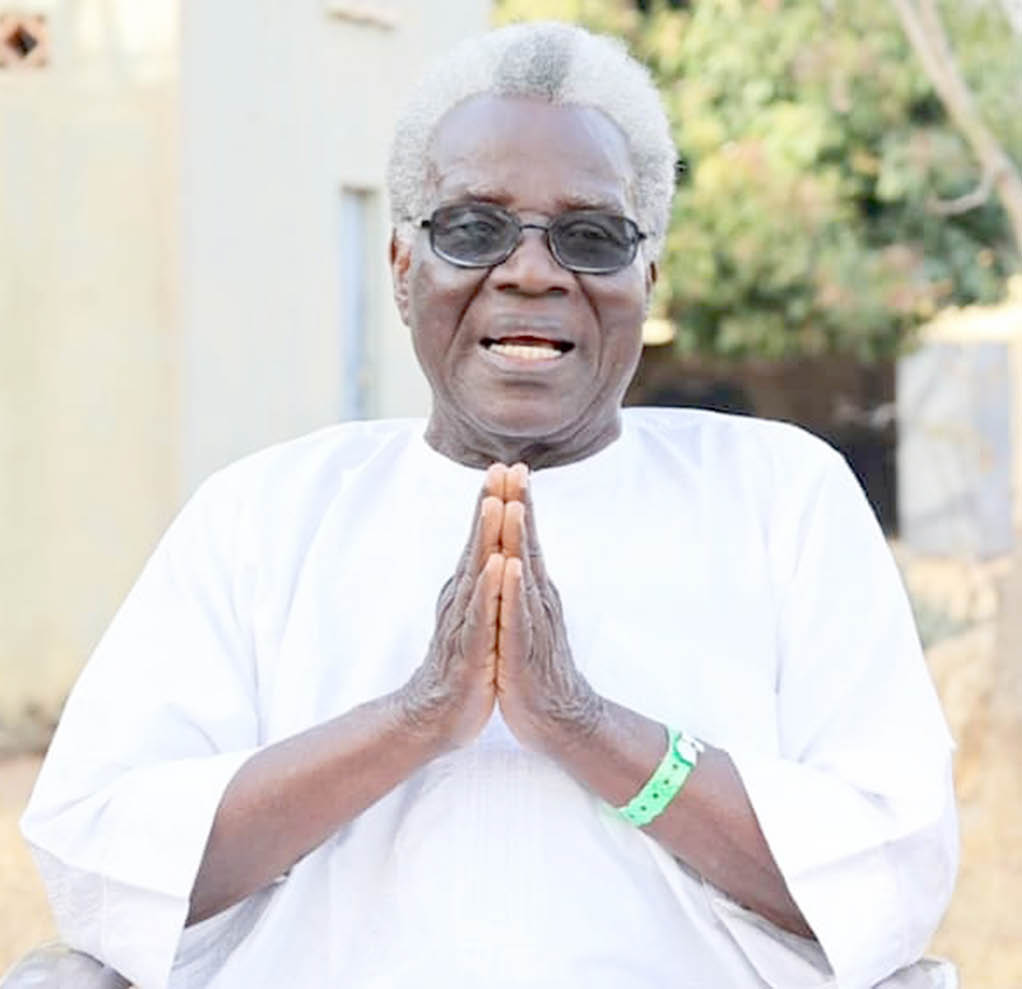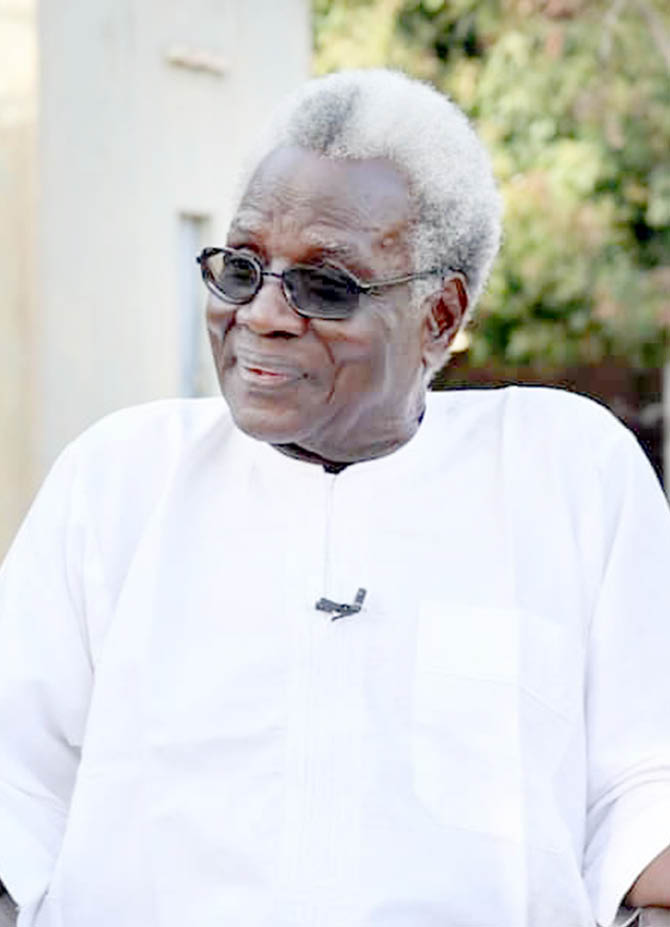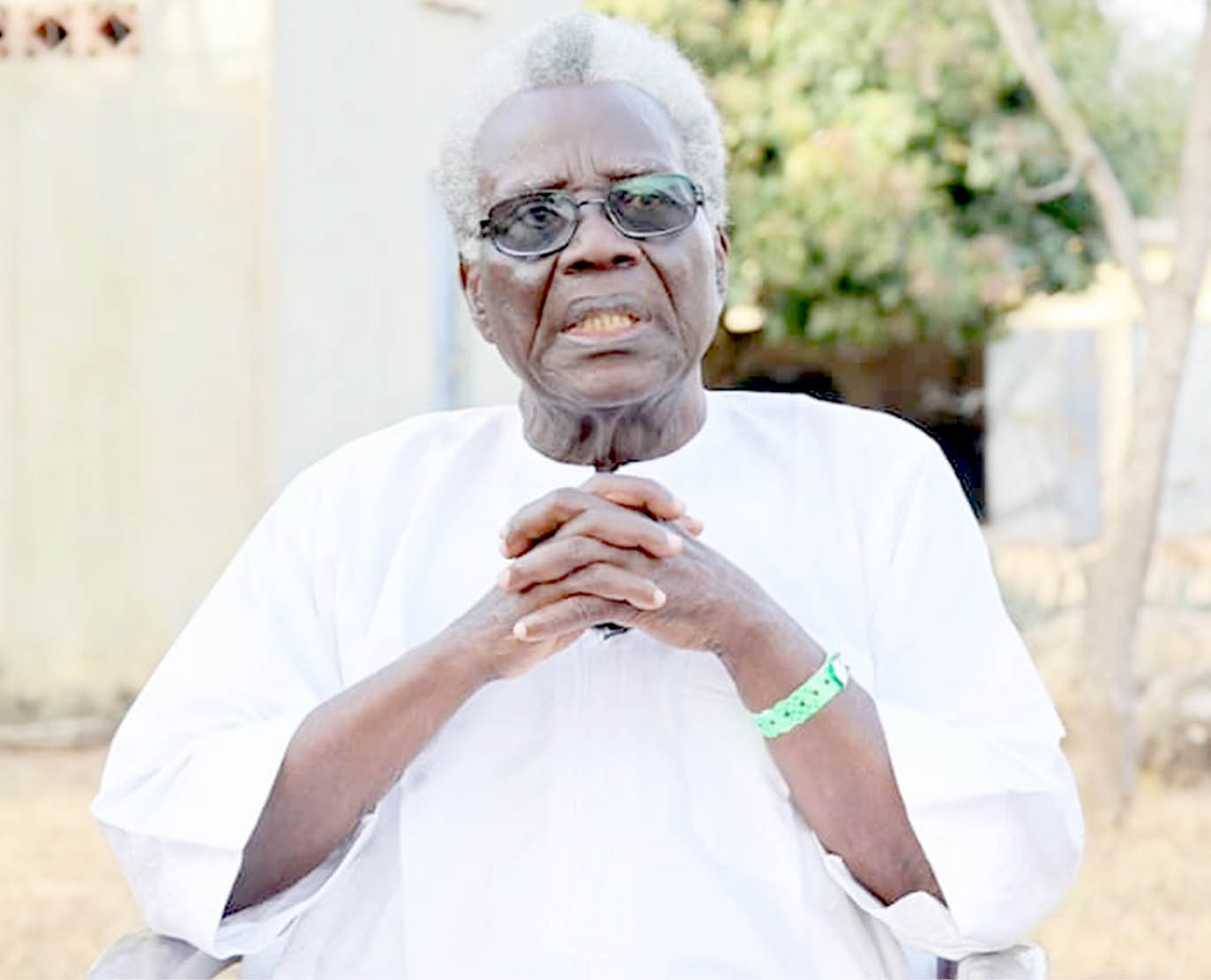Professor Justine Iyorbee Tseayo was, for a long time, a don in the Ahmadu Bello University (ABU) and University of Jos. He is now a professor emeritus at the Benue State University. He was a one-time Minister of Mines and Power under the regime of General Olusegun Obasanjo. He was also a Director-General of the National Institute for Policy and Strategic Studies. In this interview he spoke on how he started life in Gboko, Benue State, and other interesting issues.
Can you tell us about your early life?
I grew up as a local boy in Gboko. I think I must have been at the age of four and too young to be sent to school, but my grandmother insisted that I should go to school because she didn’t want my father, who was in the army during the Second World War to take me away. My father had said that when he came on leave, he would take me to India; and my grandmother was afraid. She took me to her relative, Mr Tarka Mashi, the father of the famous J.S. Tarka, under the pretence that I would be going to school. So I found myself in school at a very early age, which was very challenging. But I enjoyed being in Gboko.
I moved from the village, where I was staying with my grandmother, to Gboko to go to school. The school I attended was called Meyan Clan Primary School, which is now called Gboko Central School.
Did you also attend secondary school in Benue State?
Yes. From Gboko Primary School, I became competent enough to be admitted into Benue Middle School, Katsina-Ala. That was in 1949. I was there for five years and finished at Middle Four.
Small Businesses Grounded As Naira Scarcity Bites Harder
All female bouncers group changing stereotypes
Every province in northern Nigeria had a middle school. And one was lucky to be accepted in those schools.
Can you remember some of your classmates?
I belong to the Katsina-Ala Old Boys Association (KAOBA) here in Plateau. The Benue Middle School is now called Katsina-Ala Government College.
I think one of my classmates, the Emir of Nasarawa, Ahmed Hassan, died recently. A couple of them are no longer alive.
Was Yakubu Danjuma, who was perhaps the most famous Katsina-Ala old student, ahead of you in school?
General T.Y. Danjuma was also my junior by only one year. He played a very prominent part in the Katsina-Ala Old Boys Association. He donated a lot of money to renovate the school, including the library and things like that. He has done exceptionally very well for the school.
It seems you did most of your university studies abroad, is that correct?
Yes.
How did this come about—were you lucky to get a scholarship or you were able to sponsor it?
I think you are right to use that word, lucky. I think it was God’s providence for me to have applied to Ruskin College at Oxford and they accepted. I had no money to even travel to Lagos from Kaduna, let alone go overseas. But Paul Unongo, who was courting my sister, was working as a social welfare assistant in Kaduna, where I was also working at a government-owned printing press.
He talked to his senior, Mr Douglas Green, a Canadian, and told him about my case. Green was so sympathetic and said he could help.
He needed to train people to become social welfare officers and I got admission to study at Oxford University, so he helped me apply to the Northern Nigeria Scholarship Board. I was interviewed and was lucky to have gotten the scholarship that took me to Oxford University, where I did a diploma in Public and Social Administration.
When I finished that, I was accepted to read for a degree in Psychology and Philosophy at Bristol University. After that, I came back to Nigeria and was promoted as a social welfare officer. I started a school for social welfare officers in Zaria.
I was lucky to receive another scholarship, this time from the British government to study again in the United Kingdom. I did a postgraduate diploma at the London University College.
When I finished that, I became curious and wanted to study more. Then I was accepted at the University of Essex to read for a master’s degree in Sociology. After the master’s degree, I was lucky to be accepted to read for a doctorate degree in Sociology at the University of Sussex in Brighton.
That was how I got a doctorate degree in Sociology; and immediately, the University of Ibadan recruited me as a research fellow.
Prof Ishaya Audu, who was the vice chancellor of the Ahmadu Bello University, heard about me and said he was looking for northerners to populate the school. He asked what I was doing in Ibadan, where they already had many people, and we didn’t have enough in the North. That was how I ended up at the ABU as a lecturer in Sociology.

It looks like you had some tussle with some of the radical scholars there; how was your time at ABU?
I enjoyed being at the Ahmadu Bello University because I was perhaps the first northerner with that level of education in the Department of Sociology. It didn’t take long before I became the acting head of the department.
We had radical people like Patrick Wilmot, Yusuf Bala Usman and others, who were really strong intellectual characters; I don’t know whether I should call them Marxists. Let me not use any label, but they were strong. I didn’t want to join that gang because I felt I was older than them and my own look on life was different.
I did not go to a full secondary education. When we finished from middle school, few of them were upgraded to secondary schools; Bauchi was one of them. Some of my classmates were selected to go to Bauchi and complete full secondary education; some went to Katsina, while some went to Kabba. I was selected but I didn’t go because my mother said she would have to get married again because of poverty. There was the need to look after my brothers and sisters. But I told her that I would not want her to do that. My grandmother also said she should not get married again. So I came to Kaduna to look for a job.
Was the difference between you and the people you described as radicals in ABU because you were a western-trained scholar coming to meet indigenous types like them?
Frankly, the college I attended at Oxford was famous for people like Tom Mboya of Kenya, who were really left-wing radicals. I remember that professors in the college always talked to me about Tom Mboya and saw me as a future radical – left wing intellectual in Africa. But I didn’t get to that level. I cannot now rationalise why I refused to go to that extent. I was a left winger alright but never reactionary or outright far left; I was perhaps at the middle of the left.
Did your movement to the University of Jos from ABU have anything to do with the feeling that you were an outsider in this tradition of radicalism?
No. Professor Gilbert Onuaguluchi, who was appointed the first vice chancellor of the University of Jos, which was created in 1975, asked after me, saying he was looking for people from Plateau and Benue, or the Middle Belt sort of, to start helping to build the new university. He said I should apply if I was interested.
I applied and was assessed by international scholars. They said I was competent to be promoted a professor, so I was promoted when I came to Jos.
Maybe it was the attraction to become a professor at that early age that pushed me to come to Jos, otherwise I loved being at the ABU and working with Professor Ishaya Audu, Isah Mohammed and a number of them.
I remember that I and the then registrar, Michael Angulu, used to meet at the club. It was a jolly sort of gathering of young northern intellectuals; we enjoyed it.
Are you the first Tiv professor?
Yes.
Did this give you some kind of leverage politically; did it make you prominent beyond the university community?
I don’t know. I wasn’t even interested in going into politics. And I didn’t think I was good enough to be an academician because, as I told you, I finished at Benue Middle School. I did the General Certificate in Education (GCE) and all that by private tuition as I was working in Kaduna and Bauchi provincial office as a clerk. I was taking correspondence courses and examinations and passing them, but I didn’t think I was good enough to be an intellectual. When I was being moved like that, I just felt very excited.
But the government kept appointing me into positions of service. I was nominated into the Constitutional Constituent Assembly of 1977 – two of us: myself and one professor of medicine from the University of Lagos.
When I finished from there, I was again called by the government and appointed a Minister of Mines and Power. Concerning politics, I didn’t think I had the knowhow to lie and tell people things I knew were not right.
Did that affect your stature among your people in Tiv land, even in the community-based type of politics?
Many Tiv people heard about me but they did not see me. I was all the time in the University of Ibadan, Ahmadu Bello University, University of Jos. I never worked in Tiv land, but they heard about me and felt very pleased and proud of me.
I remember meeting one priest who said that each time they heard that somebody was a professor they asked if it was my type, and if they said no, they would say the professorship was not real. That was how I realised how they highly regarded me.
But I remained the young man from a poor family, level headed and humble, not wanting to be what I didn’t think I was.
In your profession you were climbing the ladder; for example, in the University of Jos you quickly became a head of department and dean, but you never became a vice chancellor, what happened?
It is interesting. I am glad you asked that question. Actually, I was appointed, or shall I say anointed as the vice chancellor of the University of Maiduguri. I happened to know this through the first vice chancellor.
Before Jibril Aminu?
Yes. He told me that I was going to replace him. But Aminu, who was on sabbatical in America, came back. He was the secretary to the National Universities Commission (NUC) in Lagos. Before he came back, he knew what to do. He did what he knew how to do and became the vice chancellor instead of me, but it didn’t bother me; I didn’t hold a grudge. I liked Jubril, we knew and respected each other very well. That was how I missed that but in Jos, which was a new university, I was the head of the Department of Sociology, dean of the Faculty of Arts and Social Sciences; dean of Law, Marketing —five different positions.
At different times?
At the same time. It was a new university without people, so I had to start those departments. I went about recruiting professors for those faculties.
I spent most of the time talking to contractors handling university buildings and supplying materials. I was very busy travelling and doing these things.
At the same time, I was the deputy vice chancellor, which was the highest position I attained.
At another point in your career you were in the National Institute for Policy and Strategic Studies (NIPSS) as director-general; was that a challenging job or professors are often given that position to relax and while away time?
It was a very challenging job. It was the then President Shehu Shagari that appointed me. Initially, he told me that he wanted me to be a deputy secretary to the federal government.
But Shehu Musa advised that I should take over from General Ogundeku at the NIPSS since it was a position they were going to treat me as a vice chancellor.
So they sent me there. I thought it was a challenging position, but I enjoyed it.
That position was strategic. I knew that policy was strategic and necessary for the survival of Nigeria, so I thought it was good for me to talk to top Nigerians in the military, permanent secretaries, university professors and the rest of them to know what we would do to make Nigeria survive. I enjoyed doing it.
But after a few years, I found out that government was not paying much attention to what we were doing there. It was like another university, where we would just brainstorm, research and top people who knew Nigeria would prepare special papers.
We handled materials on Nigeria’s economy, security, intelligence, and I thought the government would be very interested, but it was more interested in funfair. At the end of the year, I felt so sad that they didn’t take us seriously enough.
When I travel round the world I found that similar institutions were regarded very highly by the government of their countries because they were security conscious. Here, they treat the institute like another university, which is sad.
People who passed through the institute were just using it as a means to get higher in their professions and I felt very sad. And I think it is still like that; maybe they have changed, I don’t know.
You are now a professor emeritus in the Benue State University, which suggests that you have retired; does it mean that you have totally disengaged from the University of Jos? Secondly, what do professors like you really do?
Well, generally, emeritus professors are invited to gives lectures once in a while. But in Nigeria because of the problem of strikes by the Academic Staff Union of Universities (ASUU), you hardly have the opportunity to do that.
I have finished from the University of Jos and ABU. It is surprising that in the University of Sussex, Professor Peter Lloyd, who was my teacher and supervised my PhD degree, retired there 15 years ago but his mailbox is still there and he collects mails.
I once received a letter from the University of Jos but it was no longer through my address, and I had just retired in three years. When that happened, I said it was time to have my own mailbox.

So you were disconnected from the university where you spent most of your time?
Yes, that’s how they see it in Nigeria. It is a shame.
Although I come from Benue, I live in Jos, where I also vote and pay my taxes. My pension comes from the university but they feel I am no longer their own. Why is it so in Nigeria? I don’t know any reason. I am supposed to have a mailbox there until die.
Would you have loved to give lectures occasionally?
Exactly. They could call me to supervise PhD students and pay me a little if they want. But they don’t do this in Nigeria.
But it is different in Ibadan. Professors of the University of Ibadan still have connection with the school, but only up here, I think nobody cares.
So what do retired professors do, like in your own case?
Most of the time, what I do is gardening. I also do a lot of reading and try to keep very close to God my creator because I feel I don’t know when I will go home, which means heaven. I do these three things very deeply.
Is that enough to keep you in bread and butter?
It is not enough. My operation is very small, so I just manage and live on the goodwill of friends.
The national chairman of the Peoples Democratic Party (PDP), Senator Iyorchia Ayu, has been very kind. He supports me in many of my bills. But he is not the only one.
Is he your former student?
Yes. He was my student in ABU. Many people passed through me. I brought him to Jos as my research assistant, graduate assistant and sent him off to the United Kingdom to do his doctorate degree. He is the only one who is very compassionate. He takes care of me and I am grateful to him. May God provide more for him.
Are you 86 years old?
I was born in 1937, so I am 86.
For someone at your age, is there the tendency to start thinking that one doesn’t know when it would be over, or is it something you take for granted?
I don’t know when it would be over in this world, so why not get ready? I buried my mother when she was 100 years old and my father when he was 98 years old, but I don’t know if I inherited the gene of longevity, but I am ready.
It looks so because, to be honest, it doesn’t look that you are 86. You have just climbed the stairs and all that, so you are still strong. Are there other things you do?
I think it is purely gene. God has decided that I should stay this long for his pleasure.
Do you still eat your normal pounded yam?
I remember that recently, my doctor told me to change my lifestyle. When I asked what he meant he said I should eat more vegetables. But I still eat cow meat (red meat), fish, chips and pounded yam. However, I do a lot of walking.
And you have a large compound.
I have a large compound and I walk and I try to keep comfortable with my health. But whenever I am wanted at home, I will go.
A lot of your friends and classmates are no longer alive; how do you feel?
Many of my classmates are no longer alive, so, sometimes I wonder whether I am overstaying my welcome.
But 86 is still fairly young, don’t you think so?
I don’t feel the age. I tell people that I know I am 86 but I don’t feel it. I still feel like when I was in secondary school.
Do you feel underutilised; I mean, do you feel the government of the day can call you to do more?
I feel thoroughly underutilised. I think I would do a lot more.
Why do you think people like you who have the knowledge and experience are ignored?
I usually ponder quite a lot on this question. I did not pay much attention to getting close to God or being righteous, but since I have been ignored, which I think is deliberate, it has helped me a lot to be closer to God, which I think has made me a better person than when I was preoccupied with government work and things like that.
A man has two parts – the flesh, which belongs to this world, and the spirit, which belongs to the higher realm. I think I paid more attention to the needs of my flesh, being in the world. But now, I am in the world but not of the world. I think it is because of the time I have had for myself for many years that I learnt to be like this. And it has helped me.
I thank my enemies; they are now my friends.
For ignoring you?
I thank them because if they hadn’t ignored me I would still be enjoying myself, forgetting that one day I would face judgement.
How is family life for you?
Family is fine. I have a second marriage. For my first wife, I am sitting here looking at her grave. Our children – three boys – are married. They all studied in the UK and are living there. They keep in touch regularly and I am very happy. For the new marriage, I have a good companion. She is very strong on the spiritual side, and that has helped to keep me on the straight and narrow.

 Join Daily Trust WhatsApp Community For Quick Access To News and Happenings Around You.
Join Daily Trust WhatsApp Community For Quick Access To News and Happenings Around You.


